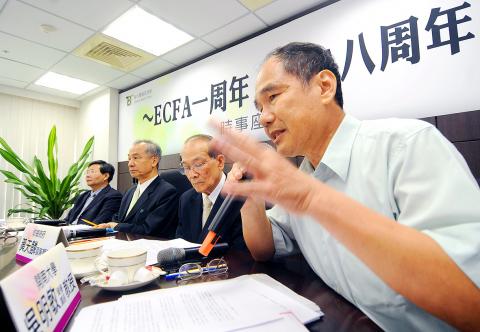|
ECFA impact should be reassessed:
academics
By Vincent Y. Chao / Staff Reporter

Taiwan Thinktank executive
committee member Wu Ming-ming, right, and other speakers attend a Taiwan Brain
Trust seminar in Taipei yesterday on the first anniversary of the signing of the
Economic Cooperation Framework Agreement (ECFA) and the eighth anniversary of
the Closer Economic Partnership Arrangement between China and Hong Kong.
Photo: Liao Chen-huei, Taipei Times
Taiwan should carefully reassess the
Economic Cooperation Framework Agreement (ECFA) with China in light of new
information that suggests a growing economic reliance on China, academics told a
forum yesterday.
Wu Rong-i (吳榮義), chairman of Taiwan Brain Trust, which hosted the event, said
the government needed to adopt an attitude that favored long-term planning
rather than focus on “short-term gains.”
The think tank unveiled its conclusions following a series of studies analyzing
the effects of the ECFA, which after being signed in June last year lowered
cross-strait border tariffs.
“Although Taiwan’s investments in China have risen, foreign investment coming
into Taiwan has bottomed out. It will have repercussions for Taiwan’s economy
and stock market and will increase the rate of our marginalization,” Wu said.
Figures published by the think tank show that Taiwan’s capital flow to China has
grown significantly under President Ma Ying-jeou (馬英九). In the first quarter
this year, investments to China grew 65 percent on an annualized basis, while
foreign investment fell 34 percent.
Acknowledging the problems of looking at a problem from any one aspect, the
panel also covered angles ranging from Taiwan’s agricultural industry to the
stock market and stagnant salaries.
Looking at the sale of the country’s agricultural products to China, National
Chung Hsing University professor Wu Ming-ming (吳明敏) said that while that figure
grew, so did China’s agricultural exports to Taiwan.
While Taiwan’s exports grew at a slightly higher rate, Wu said this was
accompanied by the transfer of agricultural know-how across the Taiwan Strait,
which in his view cast doubt on the president’s promises that Taiwan’s
agricultural industry would be largely immune to the ECFA.
Looking at the agreement from the perspective of the stock market, former
national policy adviser Huang Tien-lin (黃天麟) said the ECFA had made the Taiwan
Stock Exchange more susceptible to global upturns and downturns, as exemplified
by the recent drop following the credit crisis in Greece.
“This is because once the capital and human talent of a small economy flows into
a large economy, the small economy often becomes marginalized by the larger
economy,” Huang said.
Comparing the ECFA to the Closer Economic Partnership Arrangement (CEPA) signed
between China and Hong Kong in June 2003, Huang said the repercussions for Hong
Kong included “lower average wages and lower productivity” for workers in the
manufacturing industry and “an increase in poor people” overall.
Those effects could soon be felt in Taiwan, he said.
In terms of politics, Hsu Chung-hsin (許忠信), an associate professor of law at
National Cheng Kung University, said that in addition to economic losses, the
ECFA also threatened Taiwan’s sovereignty.
He said that by signing the ECFA under the same format as that used for the CEPA,
Taiwan risked presenting to the world that it had accepted Beijing’s “one China”
principle.
As Taiwan and China are both WTO members, the ECFA should have been reviewed by
the global trade body, Hsu said.
While the Democratic Progressive Party and pan-green organizations have largely
spoken against the pact, officials in the Ma administration have praised the
trade agreement, saying that it has contributed to Taiwan’s economic recovery
from the global financial crisis.
Information provided by the Ministry of Economic Affairs says the trade pact
accounted for NT$226 billion (US$7.78 billion) in economic growth that otherwise
would not have been possible.
It also created more than 257,000 jobs, lowering Taiwan’s unemployment rate by
2.5 percent, the ministry says.
|
![]()
![]()
![]()